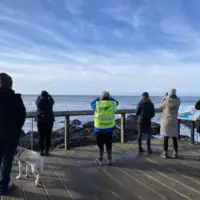
A recent Campaign for Tobacco Free Kids report has ranked Oregon No. 1 in the nation in funding tobacco prevention at levels recommended by the Centers for Disease Control and Prevention.
CTFK’s Jan. 13 report, “Broken Promises: A State-by-State Look at the 1998 Tobacco Settlement 23 Years Later,” found that Oregon, at 93.9%, and Alaska, at 89.6%, are the only states to provide at least three-quarters of the CDC-recommended funding for tobacco prevention and cessation programs. They also are among only 10 states – along with Utah, California, North Dakota, Oklahoma, Delaware, Wyoming, Hawaii and Maine – to provide more than half of the CDC-recommended funding.
Oregon voters passed Ballot Measure 108 in November 2020. The ballot initiative increased tobacco taxes to expand funding for the Oregon Health Plan and tobacco prevention activities that prevent commercial tobacco addiction and death, particularly for communities of color and young people.
“Oregon Health Authority (OHA) is excited and proud of this recognition of the state’s leadership in funding tobacco prevention at the level recommended by the CDC,” said OHA Public Health Director Rachael Banks. “We are deeply appreciative of Oregon’s collective dedication to improving the health of our communities. We have been a national leader in tobacco prevention, yet we have much more work to do to ensure health equity.”
To achieve OHA’s goal of eliminating health inequities by 2030, Banks explained, the new funding will support community-led solutions to the suffering caused by systemic discrimination and the tobacco industry’s targeting of communities of color and Tribal communities. “We are boldly stepping into a new era, partnering with those most impacted by tobacco harms to address the root causes of commercial tobacco addiction,” she said.
While Oregon has made great strides toward improving health and reducing tobacco use, certain communities continue to experience unjust health problems related to tobacco use and systemic discrimination, Banks said. The tobacco industry continues to introduce flavored tobacco products such as vaping and smokeless nicotine products that hook youth.
In addition, the tobacco industry continues its decades-long practice of targeting African American and Black communities with menthol products by placing menthol marketing and discounts in Black communities and appropriating African American culture in advertising. Menthol cigarettes are easier to start smoking, and harder to quit, than non-flavored cigarettes. In Oregon, 25% of African Americans smoke compared with 18% of whites.
Matthew L. Myers, president of the Campaign for Tobacco-Free Kids, said that as tobacco companies remain as relentless as ever in marketing their addictive and harmful products – including menthol cigarettes, flavored e-cigarettes and flavored cigars – it is critical that the states step up their efforts to protect our kids and help tobacco users quit.
“Oregon is a rare beacon of hope among the states in really boosting their funding of the proven tobacco prevention and cassation programs,” Myers said. “Voters increased the state’s tobacco tax at the polls in 2020, and now we’re seeing the state use some of the new revenue to increase program funding that will help us end the grip Big Tobacco has had on this country for far too long. The key next step is ending the sale of all flavored tobacco products – and we hope Oregon will set a great example there, as well, for other states to follow.”
The majority of new tobacco and nicotine prevention funding will be distributed to communities through grants to federally recognized Tribes and Native-serving organizations, as well as an open funding opportunity for community-based organizations who can work with local public health authorities’ tobacco prevention programs. Visit the request-for-grant-applications website, https://
Everyone deserves a fair and just opportunity to be as healthy as possible – and that includes a life free from addiction to commercial tobacco. OHA is committed to providing free help to anyone in Oregon. It’s no secret that times are hard, but you don’t have to quit alone. For free help, call 1-800-QUIT-NOW or visit https://smokefreeoregon.com/
###















